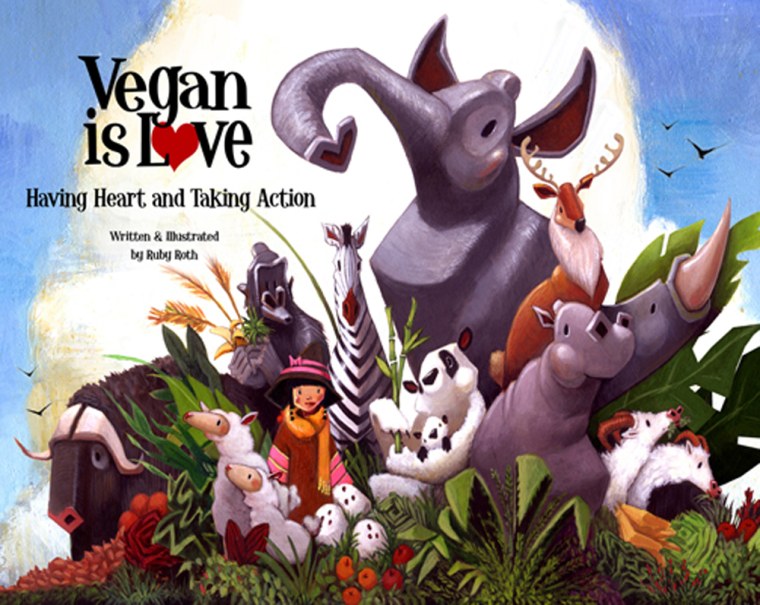While her classmates dive right into the sweet treats at school events, Ruby Roth’s 7-year-old stepdaughter Akira always asks first: “Is it vegan?”
If it’s not, Roth says, her stepdaughter politely replies, “OK, I don’t want it.”
Roth, 29, didn’t become a vegan until an adult, challenged to do so, she says, by her husband, who was raising his daughter as a vegan. “Everything else in my life kind of pointed to me being vegan.” Her mother was a lifelong vegetarian, and Roth, who now lives in Los Angeles, grew up on an organic tree farm. Her passion for veganism has spurred her to write and illustrate two children’s books on the subject. “Why We Don’t Eat Animals” was published in 2009, and “Vegan is Love” is due out April 24.
“Vegan is Love,” whose launch party was held at PETA headquarters in Los Angeles, is “sure to provoke controversy and discussion,” notes Kirkus Reviews, a book review magazine.
The book covers clothing choices, animal testing and using animals for entertainment, but perhaps the most controversial component of the book is eating habits.
“The main problem I have with this book is that children are impressionable, and this is too sensitive of a topic to have a child read this book,” Nicole German, a registered dietitian in Atlanta, writes on her blog. “It could easily scare a young child into eating vegan, and, without proper guidance, that child could become malnourished.”
Many parents might wonder how any child could thrive on a diet that eliminates all animal products, including milk and cheese, eggs, meat and fish. Yet, according to the Academy of Nutrition and Dietetics (formerly the American Dietetic Association), “appropriately planned vegetarian diets, including total vegetarian or vegan diets, are healthful, nutritionally adequate and may provide health benefits in the prevention and treatment of certain diseases. Well-planned vegetarian diets are appropriate for individuals during all stages of the life-cycle including pregnancy, lactation, infancy, childhood and adolescence and for athletes.”

A well-planned vegan diet, one that contains nutrients vital for normal development, such as vitamins B12 and D, iron, calcium, zinc and protein, won’t stunt kids’ growth, says TODAY’s nutrition expert Joy Bauer. Substantial amounts of B12 are naturally found only in foods derived from animals, Bauer notes, so breastfeeding vegan moms need to make sure they get it from fortified soy milk and cereals. After they’re weaned, kids can drink fortified soy milk themselves.
Related video: Make your own dairy-free cream, milk
“As long as the diet is carefully planned and well-balanced,” Bauer says, “vegan diets provide all the nutrition you need to fuel your growing child and typically contain higher amounts of the ‘good stuff’—vegetables, fruits, beans, lentils, nuts, seeds, etc.—than the standard American diet.”
Sarah Creighton, who writes a blog called “Veggie Kids,” is raising her three young sons as vegans. People frequently ask “How do they get their protein without eating meat?” or “Shouldn’t they be drinking milk daily?” Creighton says.
She regards such questions as teachable moments. Nuts and legumes and even veggies contain protein, Creighton points out, and her kids do drink milk, except it’s made from almonds, hemp or rice.
“The cool thing is that my older two kids have changed the way some of their friends at school eat by filling them in on little vegan facts here and there,” says Creighton, who lives in Mountain View, Calif. Like: “Have you actually seen how they make chicken nuggets? Ew!” and “Did you know whole grain bread is so much healthier for you than white bread?”
Cutting down on meat? 5 delicious, veggie-friendly swaps
While Creighton says her sons have been able to make good choices about what to eat at school and birthday parties, Bauer notes that following a vegan diet generally gets trickier as kids get older. They start to get more finicky about what they eat, she says, so “it’s much harder to ensure they’re eating a balanced mix of plant foods.”
One common challenge, Bauer says, is that “vegan kids overload on highly appealing white starches like pasta, rice and potatoes and don’t eat enough protein-rich foods like beans, lentils, edamame, nuts and seeds.”
When children are old enough, Bauer says, “you want to let them make decisions about whether they are personally motivated to follow a vegan lifestyle.”
More stories from TODAY Moms:
Breakfast with the Duggars: What it takes to feed 19 kids